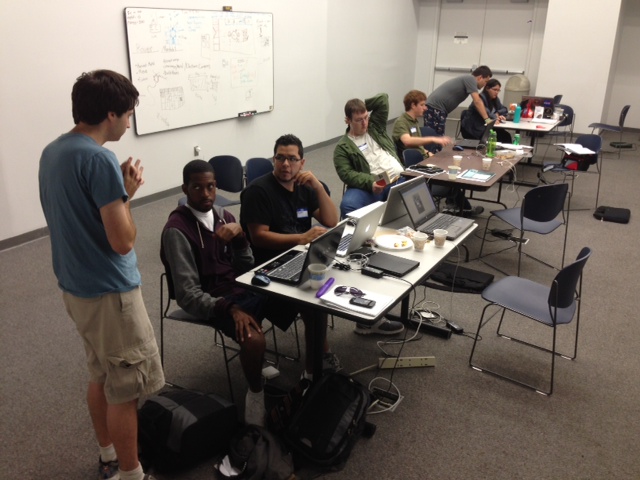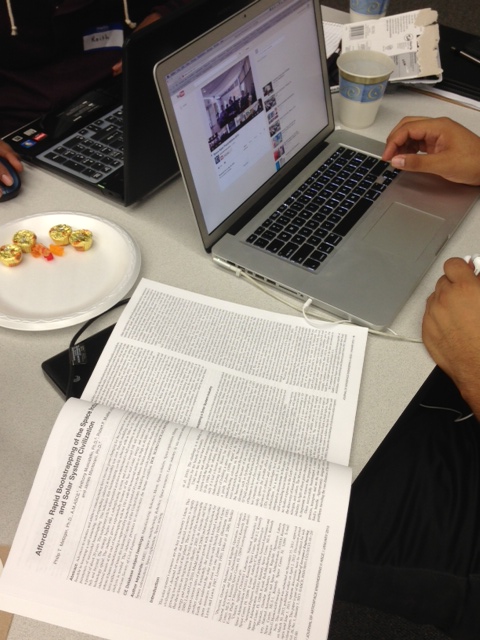
KSC Moonville spacehacker team at International Space Apps Challenge working on space colonization game.
I am sitting in a room at at the Kennedy Space Center for the International Space Apps Challenge. It is late at night, I’m very tired, and there are eight other people in the room: all much younger than me, all college students, all writing software for a game called “Moonville“. It will be a strategy game where the players simulate the beginnings of industry in the solar system. I submitted the Moonville topic to the Space Apps Challenge so that eventually people will play the game and through the game develop a winning strategy that we can use to actually start industry in space. It’s an exercise of double-nested crowdsourcing. The Space Apps Challenge is crowdsourcing the writing of the game, so the game can crowdsource the development of the strategy for space industry. I’m amazed how much these students have gotten done already, just sitting here in a room by themselves with their laptops, a wifi, and this older guy (me) answering a few questions. They started entirely from scratch before dinner. They plan to be done by lunchtime tomorrow. I didn’t know this was even possible.
A few minutes ago they were taking a pizza break, and I told them that the fate of humanity very well could depend on space hackers. I asked, what if the governments of the world don’t prioritize space highly enough to get lunar industry started? What if the commercial space companies don’t find enough investors to fund more than their immediate business plans and so are unable to truly colonize space? Who then will take humanity beyond this planet? I’m thinking it will have to be the private citizens of the world, space hackers like these young people. Individually, they may not have billions of dollars like the private investors, or trillions of dollars like the governments of the world, but collectively they have much, much more.
For example, there are seven billion of us here on planet Earth, so what if just four billion of us paid one dollar a year for ten years into this future in space? That would amount to forty billion dollars. That should be enough to get the job done. Just one dollar a year. Surely we can do that.
But we might not convince four billion people to participate. Too many people don’t understand that a higher level of civilization is really possible. It seems too much like science fiction and so they don’t want to throw away their dollar. So here is another idea. How about if just the space enthusiasts of the world do it? We have something more valuable than cash, after all. We have our abilities and our time. We could start developing the relevant technologies in our garages. Some of us could build lunar soil-mining robots. (There are already hundreds of people building robots in their garages for competitions and for fun.) Other enthusiasts could develop soil-to-metal refineries in the Hackerspaces that are popping up all over the world. Others could adapt 3D printers for use with lunar-derived feedstock. Still others could write software to teleoperate this equipment. How about if we agree to build these things for a few years and then bring it together to a volcano or to a desert location for a full-up, lunar-analog field test? We could demonstrate the equipment functioning like it would on the Moon, robots building robots from nothing but the soil and some ice and the sunlight as inputs. (We could add some carbon dioxide and ammonia to the water ice to better simulate the chemistry of lunar ice.) It would certainly be a grand party, as well as a great field test! You could count me in!
So how about if we do this every other year for a decade or two, improving our technologies until we have engineered an entire set of hardware that can build a copy of itself? It would be like the Global Village Construction Set, but designed for the Moon. It would be a tangible demonstration that self-sufficient space industry is now possible, that humanity can master the solar system and possess billions of times greater capacity to do things than we can here on planet Earth. It would demonstrate the imminence of human civilization at a truly higher level and the possibility to solve the big global problems including pollution, poverty, and resource depletion. It would give hope and excitement to the next generation of youth. It would enable us to do great things on Earth, in our solar system, and in the galaxy. If we do this — in our spare time in our garages — how could the politicians and the corporate financiers of the world fail then to pay the last bit of cost in sending it to the Moon?
The eight space hackers busily writing software here where I sit are by no means alone in the International Space Apps Challenge. Over nine thousand space enthusiasts are participating in this event tonight. Some are in other rooms of this building, working on more of the 52 challenges besides Moonville. And participants are all over the world, including the 83 official event locations in places like Tokyo, Manila, Abu Dhabi, Managua, Nairobi, New York — cities in 44 countries on all seven continents. Eleven of the locations are completely “sold out” with no room for more participants. According to the NASA website, those are in Adelaide, Bangalore, Bogota, Guatemala City, London, Monterrey, Recife, San Francisco, Santa Cruz, Santa Marta, Santiago and Toronto. Space enthusiasm is not limited to the countries that are already flying in space! It is a global phenomenon. The young people that I am watching in this room are right now collaborating with others in Ecuador. Meanwhile, I’m answering Moonville questions from Lieden, emailing participants in Rome, waiting for the 2:30 a.m. Google Hangout with Jakarta, typing this blog post, and reflecting on how the fate of humanity might depend on young space hackers like these.
And you know what? I’m feeling pretty good about that.


WOW!!! This is Fantastic!!
Hi, I just came here from the SpaceGAMBIT group on facebook.
About a year ago I started ranting at the internet about this crazy idea of space enthusiasts and hobbyists getting organised enough on a global scale to run a proper space program. An organisation that potentially could match or even outperform current corporations and even some nations.
This system would heavily depend on the internet and some form of crowd funding and crowd organising platform that could coordinate fund collection and distribution, and also splitting the large problem of getting into space into tiny chunks and distributing it amongst the makerspaces of the world /or anyone else who wants in to be frank/. All of this would be solidly based on opensource technologies and open science principles, sharing information for the mutual benefit of faster problem solving and implementation of solutions.
I don’t think current crowd funding sites have what it takes to get this done, but I do think that it is achievable with the addition of using the wisdom of the gaming industry. Eventhough there are a lot of space enthusiasts out there like myself, there is no single project that managed to round them up and concentrate their attention more than games like EVE online. I have also found myself hesitating at sharing my resources because of trust issues or because of not being able to see how a certain project would make it. On the otherhand I find it much more easy to spend my money or time on entertainment of all sorts despite the fact that I would love to see my money and time make a difference for all of us.
I think if we used some tricks from the gaming industry, and tricked ourselves into an entertaining game that would not only motivate us to spend our time at makerspaces or contributing in other ways towards a crazy space program like this, but would also make it easier for us to part with surplus money, then we could get this done.
With the handicap of almost no programming skills I started working on a game. I am learning as I go along. I want to try and have a go at a new version of crowd funding and crowd organising. I also want others to try because at the pace I am doing this, it probably will never be done.
I encourage anyone who is reading this and knows programming to start their own project because I don’t think crowd funding has reached it’s true potential. Also if anybody is interested in a chat or discussion, or have any input regarding my lame project just shoot me a message.
You can find me at freespaceships.com. It’s just a stupid blog I used to vent some steam last year because my brain was malfunctioning for a while. The only reason I posted a comment here is because I am still looking for people who are either already working on this or would like to work on this. I can garantee no adds, or popups, and a lot of bad blogposts.
Cheers,
Balazs
Thanks for the excellent comments. I totally agree!
Solar Savings America is an organization dedicated to promoting the message that solar power is indeed both a clean and
cost saving solution for most consumers and businesses.
We believe that solar energy plays a large role in our future as economic
and political uncertainties impact the cost of energy.